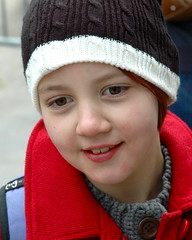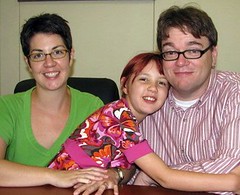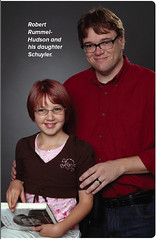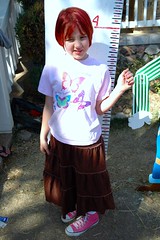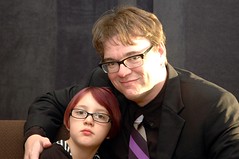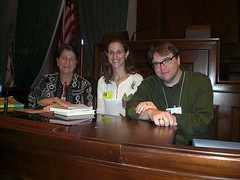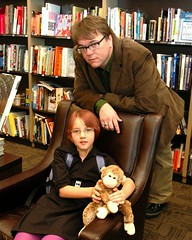Last week, Schuyler returned to Chicago in triumph.
The three of us travelled to Chicago for the American Speech Language Hearing Association's 2008 conference, as the special guests of the Prentke Romich Company, makers of Schuyler's Big Box of Words. PRC has been amazing to Schuyler, they've opened up her world in ways that we can only now begin to appreciate. It's not just Schuyler, but thousands of kids and adults who suddenly have a voice, thanks to this company and its commitment to a philosophy of giving users not just words, but language. When I wrote Schuyler's Monster, one of the things I had the opportunity to do was to stand up for all those broken kids who suddenly found voices and thank the people who made it possible.
Last week, we got to meet the people behind the Box. Schuyler got to meet the makers of her gentle miracle.
 It's easy to be impressed by the enormity of the ASHA conference. I was told that thirty thousand people were in attendence. This is the exhibitors' hall, which you can see is huge and filled with booths, each representing a separate vision for helping someone. It really is impressive on a large scale. This is the Village made real.
It's easy to be impressed by the enormity of the ASHA conference. I was told that thirty thousand people were in attendence. This is the exhibitors' hall, which you can see is huge and filled with booths, each representing a separate vision for helping someone. It really is impressive on a large scale. This is the Village made real.But something happens when you actually get down onto that floor and start looking at the products being promoted. That's when ASHA becomes truly impressive, when you start to see the innovations that exist entirely to help people in need, mostly children, and when you meet the people behind those innovations.
I had the extreme honor of meeting Bruce Baker, who developed Semantic Compaction (or Minspeak) back in the 1980s. Minspeak is currently used by around 80,000 people worldwide. Its principles inform a number of communication techniques, including Unity, the language that drives Schuyler's Big Box of Words. In meeting Bruce, Schuyler was able to shake hands with the man who is literally responsible for giving her words. The fact that he reacted to Schuyler as if meeting her was a singular honor of his own speaks to the character and commitment of this man. I found a quote by Bruce just now that says it all.
"The most rewarding aspect of my work is getting to know people with complex disabilities who, though unable to talk, want to participate in life to its fullest." Bruce has given companies like Prentke Romich the tools to do just that.

In a speech I gave over the summer, I talked about how those of us who are parents of broken children have been ambushed by their monsters. We've become warriors for our kids because we were chosen to do so, by Chance or Fate or the bully God, and we need the doctors and the teachers and the speech-language pathologists who have chosen to properly arm themselves and go into battle with those monsters. Plenty of people can attest to the fact that I was perfectly happy being a selfish ass before Schuyler was born. I've always been humbled by the thought of those people who saw a need in society and stepped up to do something about it. I didn't choose this life; they did.
But it's not so simple. The truth is that most of these people, many of whom have become heroes of mine, have come to the battle with their own casualties and their own life lessons. They were chosen, too, and in being chosen, they've changed the world.
One gentleman whom I have wanted to meet for a long time showed up at the PRC booth late in the afternoon. Blink Twice CEO and President Richard Ellenson was a successful ad executive whose son Thomas was left with severe verbal limitations due to cerebral palsy. When traditional augmentative speech devices didn't work for his son, Richard stepped up and developed one that did, focusing on ways to communicate quickly and effectively.
The result was the Tango, and I've been extremely impressed with the work Richard has done. Despite her enthusiasm for the Tango when she got a chance to play with it, Schuyler's needs aren't really appropriate for this device; she's thriving on the language-building capabilities of the PRC Vantage. But I recognize very clearly that there are design and philosophical aspects of the Tango that are revolutionary, although like most great ideas that change the world, they seems obvious once you see them.
The Tango doesn't look or feel like an assistive device for a child with a disability. It uses natural-sounding language (and some very high tech magic to turn adult voices into children's) and kid-friendly graphics. More importantly, in a world where Schuyler and her friends are familiar with iPods and game controllers and the Wii, the Tango melds smoothly into their lives, not as a medical device but as part of their digital world. From a design standpoint, the Tango is just one more crucial and cool device for these plugged-in kids to recharge at the end of the day.
I talked to Richard about what I thought was the brilliance of the Tango. "If you walk around this hall, you'll see a lot of impressive and wonderful innovation," he said. "But all this technology says the same thing when you walk in a room with it. It says, 'I have a disability.'"
I love Richard because he brought his specific talents as an advertising innovator to bear on the problem that his son presented, and in doing so he made a difference. Everywhere I turned, I met people doing the same thing, for the same reasons. They were taking their life skills and unique talents and they were turning them into weapons against the monsters.
Including me, I guess, in my own small way.
When your life finds a sense of mission, it's humbling, and it's energizing. Mostly, though, it just makes you roll up your sleeves and get busy.
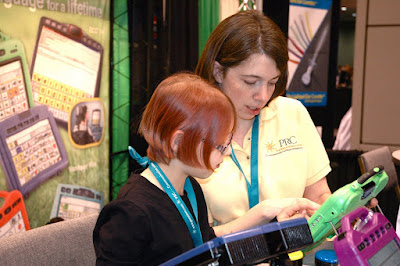
Easily, the most gratifying part of the experience for us was the chance to meet and work with the amazing people at Prentke Romich. For the past three and a half years, Schuyler's life has been changed and her horizons exploded by a device called the Vantage Plus. It's her Big Box of Words, and PRC makes it. When a company has such an astonishing impact on the life of someone you love, it can be a surprise to discover the humanity behind that company.
Prentke Romich has been very enthusiastic about promoting Schuyler's story, and while I recognize the benefit that they derive from her story and the exposure that the book has given to their cause, the fact remains that it is a cause, and one to which that we are thrilled to be able to contribute. When we met and got to know the people of the company, it became clear that the work that they do is their mission, and the passion that goes into that work is fired by stories like Schuyler's, stories that show how much of a difference they are making in the world. When they met Schuyler, their pride in her accomplishments was palpable. I know just how they felt.
Our gratitude goes out to our new friends Bob Nemens and Cherie Weaver from PRC's marketing department, and the rest of the PRC crew in Chicago, all of whom Schuyler fell in love with, as she tends to do with people of quality. Thanks to Trudi Blair, Judith Meyer, Angie Neveadomi, Sarah Wilds, Margaret Perkins (sorry once again for appropriating your name in my book) and Julie Packer for everything you did for us. Sarah and Julie P. in particular were subject to Schuyler's "I'm upgrading from my smelly old parents" affections. How sad for her that at the end of the day, Schuyler is always stuck with Julie and me.
Finally, I want to say what a pleasure it was to meet David Moffatt, President of PRC. That's a daunting thought, meeting the president of the company, but Schuyler saw right through to his big heart, and decided he was her new best friend in a hurry. David was incredibly generous for bringing us to Chicago, and was a gracious host to us while we were there. Meeting him and watching him with Schuyler, it became clear why he does what he does. Well, that's true of everyone at PRC.
Bob put together this little video to send to PRC people. I think the thing to notice is that while I'm being a big Chatty Cathy doll, Schuyler is serious and focused. She signs books like a professional, and is polite and cool. She appears to be taking care of business.
This was an interesting trip because while I was in familiar territory, it gave Schuyler and Julie the opportunity to take on very public roles. Schuyler was a champion, signing every single book that I signed (over a hundred in about two hours, I believe) and charming everyone she met. She spent a lot of time exploring different PRC devices, particularly the ECO-14 and the Vantage Lite, and seemed to take her role very seriously. She had all day Saturday to run around Chicago, gawking at the Bean and stalking dinosaurs at the Field Museum, but Friday was all business. When people ask how Schuyler is dealing with all this book business, I can tell them that she takes it seriously, and she is proud of the work we've done. The work we've done, and that we continue to do.
The conference was a new experience for Julie. From the very beginning, she has chosen to keep a low profile, both in my online writing and, to a lesser degree, in the book itself. I'm not sure I have the talent or the ability to tell Julie's story, which is very different from mine, so I've certainly been okay with her decision to lay low. But the thing that seems to escape some people (including the charmer at the conference who asked her how it felt to be "eclipsed") is that Julie is an incredible mother to Schuyler, and is every bit as involved in the decisions towards her care as I am. We play good cop/bad cop a lot, but we tend to trade roles and keep everyone guessing.
Julie's fantastic in whatever role she takes on. While I present a very public face and build an extremely visible platform from which to advocate for Schuyler and her broken brethren, Julie quietly but brilliantly does her work. Her work is God's work, really, regardless of whether or not he actually bothers to do it himself. In Schuyler's life, God is like a crazy uncle who might show up at Thanksgiving drunk and belligerent, or not at all. For Schuyler, God is optional. She has Julie, and that's enough.
At ASHA, Julie suddenly found herself presenting a public face, one that she'd really never been asked to show before now. I'm proud to say that she stepped up and was brilliant. She was articulate and informed, and she expressed the hardships and the victories of her life as Schuyler's mother with eloquence and clarity. I've never been prouder of her, or of Schuyler.
Team Rummel-Hudson was on last week. We get it right sometimes.
 The design innovations I was talking about earlier in regards to Richard Ellenson are also reflected in PRC's newest generation of devices. Putting Schuyler in front of these machines was perhaps the most personally gratifying part of the trip. She has reached the point where she dives into the technology behind these devices without hesitation, and more importantly, she intuitively gets how to use them.
The design innovations I was talking about earlier in regards to Richard Ellenson are also reflected in PRC's newest generation of devices. Putting Schuyler in front of these machines was perhaps the most personally gratifying part of the trip. She has reached the point where she dives into the technology behind these devices without hesitation, and more importantly, she intuitively gets how to use them.We came to an important decision at ASHA, after watching Schuyler explore two different and amazing devices. After exploring some funding possibilities that didn't exist four years ago, Julie and I have decided to attempt to move Schuyler up to the next generation of PRC device, in this case the Vantage Lite. In a lot of ways, it's not terribly different from her current device, but it has some new features and a new design that makes it easier to integrate into her daily life. PRC has paid attention to what its users need, particularly their younger ones, and it has created a device that looks and feels less like a speech prosthesis and more like a digital enhancement to her world.
And it comes in pink. Lord help us all...
